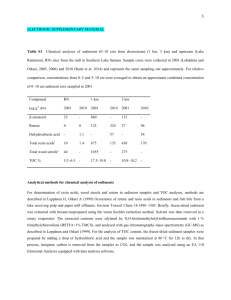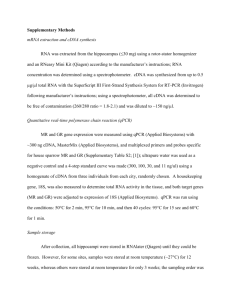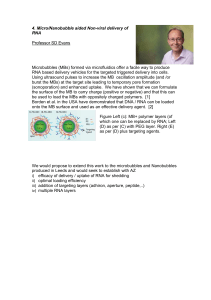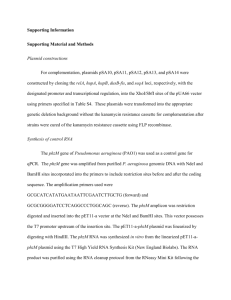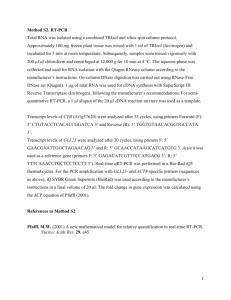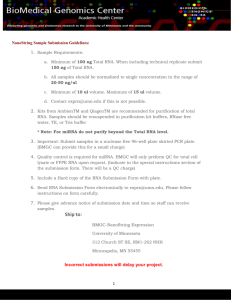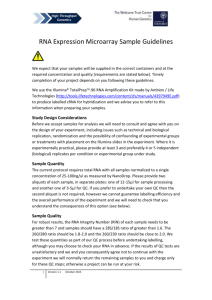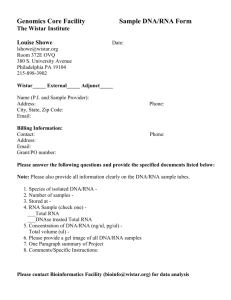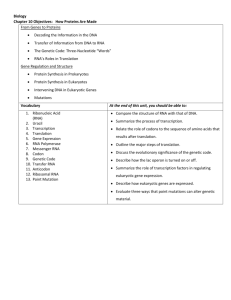file - BioMed Central
advertisement
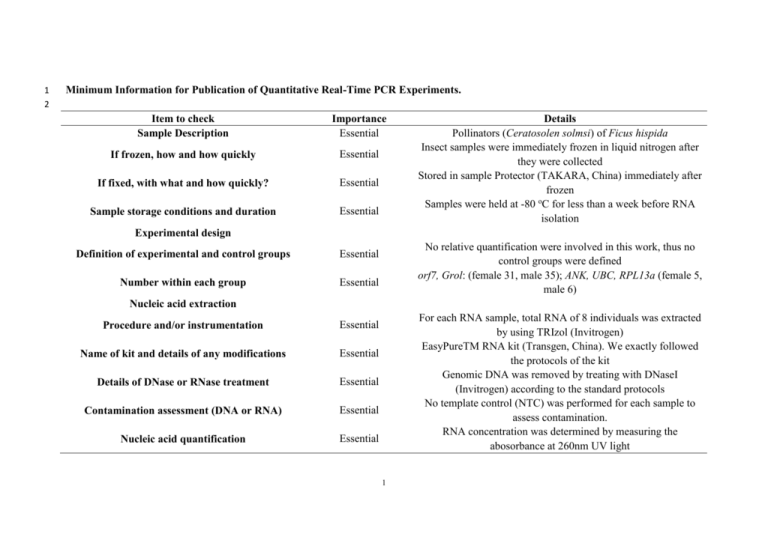
1 2 Minimum Information for Publication of Quantitative Real-Time PCR Experiments. Item to check Sample Description Importance Essential If frozen, how and how quickly Essential If fixed, with what and how quickly? Essential Sample storage conditions and duration Essential Details Pollinators (Ceratosolen solmsi) of Ficus hispida Insect samples were immediately frozen in liquid nitrogen after they were collected Stored in sample Protector (TAKARA, China) immediately after frozen Samples were held at -80 oC for less than a week before RNA isolation Experimental design Definition of experimental and control groups Essential Number within each group Essential No relative quantification were involved in this work, thus no control groups were defined orf7, Grol: (female 31, male 35); ANK, UBC, RPL13a (female 5, male 6) Nucleic acid extraction Procedure and/or instrumentation Essential Name of kit and details of any modifications Essential Details of DNase or RNase treatment Essential Contamination assessment (DNA or RNA) Essential Nucleic acid quantification Essential For each RNA sample, total RNA of 8 individuals was extracted by using TRIzol (Invitrogen) EasyPureTM RNA kit (Transgen, China). We exactly followed the protocols of the kit Genomic DNA was removed by treating with DNaseI (Invitrogen) according to the standard protocols No template control (NTC) was performed for each sample to assess contamination. RNA concentration was determined by measuring the abosorbance at 260nm UV light 1 Instrument and method Essential RNA integrity: method/instrument Essential RIN/RQI or Cq OF 3’ and 5’ transcripts Inhibition testing (Cq dilutions, spike, or other) Reverse transcription Essential Essential Complete reaction conditions Essential Amount of RNA and reaction volume Priming oligonucleotide and concentration Essential Essential Temperature and time Essential NanoDrop-2000 Spectrophotometer (Thermo, USA) RNA integrity was assessed by electrophoresis on 1.0% agarose gels stained with ethidium bromide N/A Standard curve analyses were sufficient to test inhibition TransScript II First-Strand cDNA Synthesis SuperMix (Transgen, China) was used to generate single-stranded cDNA total RNA with random primers. Amount of RNA: 1μg; Reaction volume: 20μl random primers: 2μM o 25 C for 10 minutes, 42oC for 30 minutes, and85oC for 5minutes, qPCR protocol Complete reaction conditions Essential Reaction volume and amount of cDNA/DNA Essential Primer, (probe), Mg2, and dNTP concentrations Essential PCR reactions were performed in a Mx3000P Real Time Thermocycler (Stratagene). A 20 μl PCR mixture was prepared containing 1 μl of template, 10μl TransStart Green qPCR SuperMix UDG(2x) (Transgen, China), 0.4μl Passive Reference Dye II(50x) (Transgen, China), 0.8μl primer mix(0.2μM), and 7.8 μl sterile water. The following thermal conditions for qRT-qPCR were used: 50oC for 2 min, 95oC for 10 min, and then the follwing: 95oC for 10 s, 57oC for 15 s and 72oC for 10 s for 40 cycles Reaction volume: 20μl; amount of cDNA: 1μl per reaction volume 500nM primers; 3mM MgCl2 ; 0.2 mM dNTP 2 Polymerase identity and concentration Buffer/kit identity and manufacturer Additives (SYBR Green I, DMSO, and so forth) Essential Essential Essential Complete thermocycling parameters Essential Specificity (gel, sequence, melt, or digest) Essential TransStart Green qPCR SuperMix UDG (2x) (Transgen, China) TransStart Green qPCR SuperMix UDG (2x) (Transgen, China) Passive Reference Dye II(50x) (Transgen, China) o 50 C for 2 min, 95oC for 10 min, and then the follwing: 95oC for 10 s, 57oC for 15 s and 72oC for 10 s for 40 cycles Melting curve analysis, gel electrophoresis and sequencing 3 3
